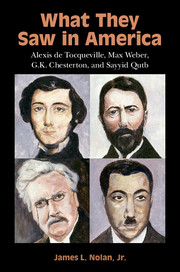Book contents
- Frontmatter
- Dedication
- Contents
- Acknowledgments
- Introduction
- 1 Pride, Patriotism, and the Mercantilist Spirit: Tocqueville and Beaumont Discover America
- 2 Tocqueville and the Quandary of American Democracy
- 3 Agrarianism, Race, and the End of Romanticism: Weber in Early Twentieth-Century America
- 4 Weber on Sects, Schools, and the Spirit of Capitalism
- 5 A New Martin Chuzzlewit: Chesterton on Main Street
- 6 Chestertonian Distributism and the Democratic Ideal
- 7 From Musha to New York: Qutb Encounters American Jahiliyya
- 8 Qutb's “Inquiring Eyes” in Colorado and California
- Conclusion
- Notes
- References
- Index
Conclusion
Published online by Cambridge University Press: 05 April 2016
- Frontmatter
- Dedication
- Contents
- Acknowledgments
- Introduction
- 1 Pride, Patriotism, and the Mercantilist Spirit: Tocqueville and Beaumont Discover America
- 2 Tocqueville and the Quandary of American Democracy
- 3 Agrarianism, Race, and the End of Romanticism: Weber in Early Twentieth-Century America
- 4 Weber on Sects, Schools, and the Spirit of Capitalism
- 5 A New Martin Chuzzlewit: Chesterton on Main Street
- 6 Chestertonian Distributism and the Democratic Ideal
- 7 From Musha to New York: Qutb Encounters American Jahiliyya
- 8 Qutb's “Inquiring Eyes” in Colorado and California
- Conclusion
- Notes
- References
- Index
Summary
The four visitors, with their unique biographies, arrived on American shores at different times in history and employed distinctive interpretive lenses to make sense of what they saw. While all had critical things to say about the United States, none was uniformly negative. In the last decade of his life, even when he had become more disapproving of the United States, Tocqueville still regarded himself as “half an American citizen,” and referred to the United States as that “grand and glorious country.” Weber, at the end of his American tour, spoke of Americans as “a wonderful people,” among whom he and Marianne found a “youthfully fresh, confident energy, a force for good.” Chesterton, likewise, admired Americans for their friendliness and lack of class snobbery and described them as “sympathetic, imaginative, and full of fine enthusiasms.” Even Qutb, clearly the most critical of the four, commended America for its vast and beautiful natural resources and Americans for their advances in science and technology.
With the exception of Qutb, the foreign visitors found Americans to be friendly, hospitable, energetic, warm, and devoid of class prejudices. They noticed and admired Americans’ voluntary habits and inclinations to join together for a variety of economic, political, and civic purposes; and they saw these inclinations as an important contributing factor to the success of American democracy. Thus, to the extent that the European visitors were critical, their assessments were characterized by a kind of ambivalence. Chesterton even made a distinction between Americans’ natural propensities and virtues and that which America exported to Europe and other places. “The real, natural Americans,” wrote Chesterton “are candid, generous, capable of beautiful wonder and gratitude; enthusiastic about things external to themselves; easily contented and not particularly conceited.” It mystified Chesterton that, instead of paying attention to these “real virtues of America,” notice was only given to the “most absurd booming and boosting of Americanization.” In Chesterton's view, the qualities of America that “reach us across the seas” are the “things least worthy of boasting.”
Or, in Jonathan Freedland's terms, what gets exported is the junk rather than the gold. Martha Bayles makes a similar point. She likewise finds a discontinuity between the character and lives of many ordinary Americans and the image of American life that is exported through public diplomacy and popular culture.
- Type
- Chapter
- Information
- What They Saw in AmericaAlexis de Tocqueville, Max Weber, G. K. Chesterton, and Sayyid Qutb, pp. 203 - 236Publisher: Cambridge University PressPrint publication year: 2016



